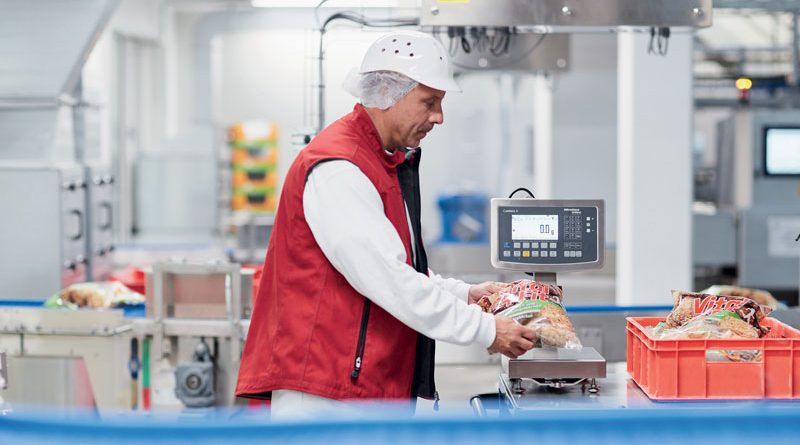Weighing and Inspection for Bakery Goods
The production of bakery goods needs high-precision technology to satisfy even more strict requirements. From X-ray inspection systems to industrial bench scales, Minebea Intec supplies solutions for every process step
by Ginevra Leonardi
In the food industry, the production of bakery goods is one of the largest and fastest-growing segments in many countries. Minebea Intec, manufacturer of industrial weighing and inspection technology, offers a wide range of solutions for the various tasks and sets of processes in this area. Before the end consumer can buy their baked goods indeed, there are a lot of processes to complete, which can roughly be divided into four steps. First, the required raw materials are delivered. The second step is the actual production, either carried out manually or by automated means, and it is made up of many individual processes from dosing, mixing and kneading the ingredients to cooling and so on. The products then need to be packaged up, during which various inspections and checkweighing processes are usually carried out. The final step is to dispatch the goods, which involves picking the order and shipping the finished bakery products to retailers or end customers.
A reliable control which is able to satisfy strict requirements
With the demand for food growing exponentially worldwide, a much higher level of automation is required in the industry, and this includes the production of bakery goods. High-precision, reliable technology is needed to inspect the baked goods in virtually every single one of the work steps, in order to guarantee the large quantities required at a consistently high level of quality. Silo weighing solutions and floor scales record the exact material quantities during the various phases, and truck scales perform the same task at goods receipt and goods issue. Checkweighers record the product weight for quality assurance purposes. Metal and X-ray inspection systems ensure during various process stages that the end products do not contain anything other than the desired ingredients. Every component that comes into direct contact with the food must fulfil strict hygienic design requirements.
X-ray inspection systems
Explains Willy-Sebastian Metzger, Director Marketing, Strategy and Business Development at Minebea Intec: “The X-ray inspection systems in our Dymond series are extremely versatile and are ideal for inspecting packaged bakery goods at the end of the production process, for instance. The systems reliably detect foreign objects in the product, and enables hollow spaces to be detected in products and check whether the product contents fill the entire packaging”. Minebea Intec offers three different Dymond models with belt widths of 200 mm to 800 mm.
Dymond Bulk is an X-ray inspection system for bulk materials that enables raw materials such as vegetables, nuts, dried fruit and grains to be reliably checked for foreign objects of any kind at goods receipt.
Moreover, as a plug and play solution, the X-ray inspection system Dylight offers all the functions required to inspect packaged food in a compact unit, and is often used as an entry-level model for X-ray inspections.
Industrial bench scales
Packaged bakery goods are checkweighed after the actual production process is complete for quality management purposes. Many bakery goods producers check their products using random samples, which are checkweighed using static scales.
One solution that Minebea Intec offers for this task is Combics, a series of verifiable industrial bench scales that can be tailored to the required maximum capacities and resolutions. Automatic statistics and printouts as well as graphical evaluations on the scale display help users with their day-to-day tasks. This solution can also be adapted if production is being expanded or integrated into a network solution, such as SPC@Enterprise.
Checkweighers which can be customised for specific needs
Checkweighers are used to ensure 100% sample reliability on the packaging line. Minebea Intec offers a variety of these solutions for these tasks. They can be configured in accordance with individual requirements and, if customers have very specific requirements, customised versions can even be produced. Metzger highlights the Flexus and Essentus product families from Minebea Intec as two series of products: “With Flexus, we are offering users high-resolution load cell technology that enables maximum throughput with absolute precision even at high process speeds of up to 2.6 m/s”. The name itself reveals another key strength of these checkweighers, their flexibility. This quality is particularly useful when needing to adapt line configurations quickly and easily for transitions between products, like when producing new and upcoming products. The latest addition to the Minebea Intec inspection portfolio is Essentus. This new checkweigher comes with various options so it can be tailored to individual application profiles, and is therefore ideal for both simple and demanding applications in the production of bakery goods. The Essentus efficiency offers the essential weighing functions, whereas the Essentus performance offers a checkweigher with advanced capabilities.
Software for process optimisation
Besides sophisticated hardware systems designed in accordance with hygiene standards, the related software is another important factor. The statistical process control software SPC@Enterprise by Minebea Intec helps manufacturers to guarantee product quality, food safety and productivity. The current release of SPC@Enterprise 4.0 offers users a comprehensive tool that combines the logging of samples and automatic in-process checks for the food industry.
Moreover, release 3.5 of ProRecipe XT offers bakeries powerful, universal recipe management software that can be used for manual formulation and weighing, as well as automated processes. The software’s simple menu guidance helps to make processes more efficient and reliable, while the comprehensive documentation of the weighing process and a host of reporting options improve transparency in the recipe process.
Both SPC@Enterprise and ProRecipe XT are able to communicate with ERP and MES systems via flexible interfaces, and can therefore be integrated in existing structures and systems.

